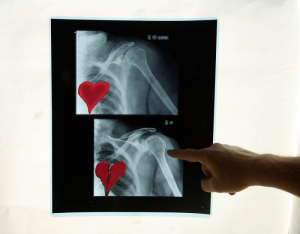When Debbie Reynolds died immediately after the tragic death of her daughter, Carrie Fisher, Todd Fisher stated that his mother's death was from a “broken heart.”
This Valentine's day it is worth noting that his claim has solid scientific support. Cupid's arrow of love can be sharp – even fatal – when a loved one is lost.
While a stroke claimed Reynolds, a “broken heart” certainly does appear to be a distinctive risk after the death of a loved one, according to a 2012 study of those suffering heart attacks after such a loss, published in
Circulation.



Ad Statistics
Times Displayed: 47150
Times Visited: 1431 MIT labs, experts in Multi-Vendor component level repair of: MRI Coils, RF amplifiers, Gradient Amplifiers Contrast Media Injectors. System repairs, sub-assembly repairs, component level repairs, refurbish/calibrate. info@mitlabsusa.com/+1 (305) 470-8013
In a review of 1,985 cases from 1989 to 1994, “the incidence rate of acute myocardial infarction onset was elevated 21.1-fold within 24 hours of the death of a significant person and declined steadily on each subsequent day,” the researchers found, stressing that “there is a heightened risk of mortality in the early weeks and months after loss, with cardiovascular disease accounting for 20 percent to 53 percent of the excess deaths during spousal bereavement.”
So there is such a thing as “broken heart syndrome,” although it can be caused by any massive stress, as well as heartbreak.
While it is associated with those at higher cardiovascular risk, such stress-induced cardiomyopathy or takotsubo cardiomyopathy, “can strike even if you’re healthy,”
according to the American Heart Association.
The condition takes its name from the
tako tsubo, a Japanese pot-shaped octopus trap that is similar in shape to hearts so afflicted.
This temporary enlargement of the organ can lead to short-term heart muscle failure, but it is usually treatable.
“Although the exact reasons behind this condition remain elusive, “experts think that surging stress hormones ... essentially ‘stun’ the heart,” according to
Harvard Women’s Health Watch. This leads to “changes in heart muscle cells or coronary blood vessels that prevent the left ventricle from contracting effectively.”
Studies also show that long-term spouses or parents of children also face a higher risk of mortality.
A 2012 study, published in the
British Medical Journal, for example, showed that the death of a child between 10 and 17 years old boosted mortality risk for surviving mothers by 31 percent.
A Danish study, which appeared in
The Lancet in 2003, found similar results. “The death of a child is associated with an overall increased mortality from both natural and unnatural causes in mothers, and an early increased mortality from unnatural causes in fathers,” the University of Aarhus, Aarhus, Denmark,
researchers concluded.
In this research, investigators suggested that behavioral and social aspects of the loss may play a role as well. Grief can lead to increased drinking, smoking or other unhealthy behaviors.
In addition, as the case with Fisher and Reynolds, the loss of such a close and loved person (they lived side-by-side), results in the shattering of an invaluable social bond – and can lead to a dreadful sense of loneliness.
In fact, when a 14-year longitudinal study that appeared in Social Medicine & Science looked at the impact of such social networks on longevity among the elderly, it
found that “a feeling of loneliness was found to be associated with cardiovascular mortality, especially for males.”
Maybe it was love's double-edged dilemma, to start off lonely or to wind up that way, that prompted the great Russian playwright and physician, Anton Chekhov, to write, "If you are afraid of loneliness, do not marry."

